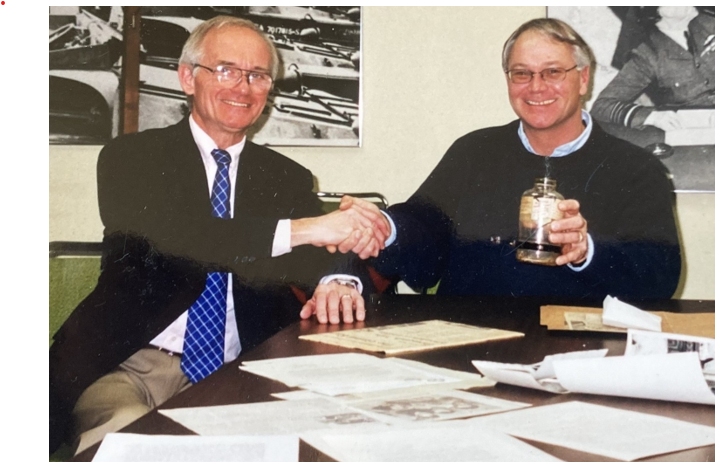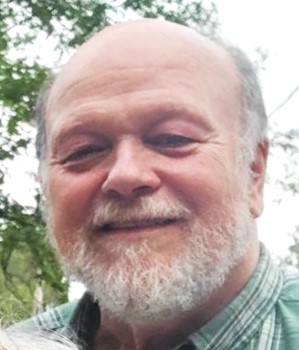By Fred Fuller
This is a true story about my father’s brother, William J. Fuller, as told to me by my cousin, his son, William J. Fuller, Jr. I know the story is true because I heard it from my father, as well, and I’ve read numerous newspaper articles that support the story. In 2024, I helped my cousin Bill and his sister Barb donate many reels of 8mm film that his father had taken during World War II to the Bentley Historical Library at the University of Michigan in Ann Arbor. The Bentley Library has a special collection on the history of U of M’s 298th General Hospital in the war.
Here’s the story:

“Dad was born in 1912 in the small town of Yale, Michigan. He was raised there, along with his older brother and sister, Frederic and Frances, by his father Roy Fuller, after losing his mother to cancer at the age of 10. I personally cannot imagine what my life would have been like to lose my mother at such a young age. Dad once told me, ‘I learned to be self-reliant,’ words I think of so often. I believe this ‘self-reliance’ was the cornerstone that shaped the rest of his life.
“Dad realized at a young age he wanted to go to college and began earning money by trapping muskrats and skunks and selling their hides. He inherited from his father a love to hunt and fish. In high school, he was active in sports, was the quarterback on Yale’s state champion football team, and became class president. He worked summers in a vegetable cannery and with his savings and borrowed money, he enrolled at Eastern Michigan University. To finance his four years of education, he worked as a laboratory assistant. In his senior year, he was elected to Kappa Delta Phi, an honorary scholastic society, and graduated in 1934 with an AB degree and lifetime teaching certificate. But the lack of teaching jobs upon his graduation would lead him in a new direction.
“I can only surmise his experiences working as a lab assistant prompted him to apply to the University of Michigan Medical School. Upon acceptance, he was once again confronted with the lack of funds. He borrowed from family and friends, washed dishes and made beds in a frat house. Summers found him at home in Yale where he built a darkroom to start a photo processing business. Along with his brother Fred, he made bows and arrows, selling them in the surrounding area.
“Dad graduated from medical school in 1938 and was elected to the honorary medical society Alpha Omega Alpha. He completed his internship and residency at University Hospital in Ann Arbor, including one year of neurosurgery. He married his high school sweetheart, Lola Clarkson of Capac, in 1941, and soon after joined the University Hospital Army Unit. Then World War II began, and he was called to Camp Robinson in Arkansas for hospital training. Little did my mother know she would not see him again until 1945.
“He was shipped in October of 1942 to England to serve in the 298th General Hospital (half the doctors were from U of M). The 298th would be the first institution of its kind to be set up by the
Allies in Europe after the Normandy invasion. Dad and the 298th landed on Utah Beach a few weeks after D-Day and set up the hospital at Cherbourg, France.
“Neurosurgeons were in high demand as the Allies moved across France against the German counteroffensive. He was soon transferred to the 15th General Hospital in Liege, Belgium, due to his year of residency in neurosurgery. The Germans were pounding Liege with buzz bombs, and the hospital was hit, resulting in 28 casualties and 150 wounded.
“After the bombing, my dad, now a Major, was transferred back to the 298th where a tent hospital was being assembled in an open field. The unit was 30 miles from the German border and treated many casualties from the Battle of the Bulge. They prepared to evacuate due to the unexpected advance of the German Army in the Bulge, but the withdrawal plans did not have to be implemented because of the stout defense put up by the First United States Army troops.
“One day, a young soldier with a severe shrapnel wound to his spine was brought in needing a blood transfusion. While giving the soldier the transfusion, my dad noticed a familiar name on the bottle of donated blood: Dwight D. Eisenhower (the SUPREME COMMANDER OF ALLIED EXPEDITIONARY FORCES in Europe!). It turned out that Eisenhower had helped with the Allied blood drive by making a donation himself.
“Dad was discharged in 1945 and returned to University Hospital Medical School, where he was appointed assistant professor of surgery. Among the war memorabilia he brought home was the empty Eisenhower blood donation bottle. This bottle was displayed in a small cabinet in our home with other memorabilia from the war. In the many years following, he would often mention to me his desire to hand-deliver it to the Eisenhower Library and Museum in Abilene, Kansas.
“Sadly, Dad passed away in 1996, before he could fulfill his wish. The bottle remained in the cabinet, a constant reminder to me of where he wished it was. In 2002, I contacted the Executive Director of the museum in regards to donating the bottle, and they were very interested. My wife Laura and I drove to Abilene, presented it to the director, and finally my dad’s longtime wish was fulfilled.
“Telling this reminds me of all the sacrifices our young men and women in uniform have made and are making, and in doing so, providing me the freedom, safety, and opportunities during my lifetime.”



